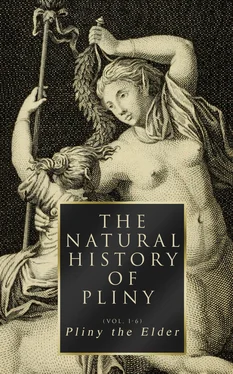The judgment pronounced by Cuvier on Pliny’s work, though somewhat less highly coloured, awards to it a high rank among the most valuable productions of antiquity. “The work of Pliny 32,” says he, “is one of the most precious monuments that have come down to us from ancient times, and affords proof of an astonishing amount of erudition in one who was a warrior and a statesman. To appreciate with justice this vast and celebrated composition, it is necessary to regard it in several points of view—with reference to the plan proposed, the facts stated, and the style employed. The plan proposed by the writer is of immense extent—it is his object to write not merely a Natural History in our restricted sense of the term, not an account merely, more or less detailed, of animals, plants, and minerals, but a work which embraces astronomy, physics, geography, agriculture, commerce, medicine, and the fine arts—and all these in addition to natural history properly so called; while at the same time he continually interweaves with his narrative information upon the arts which bear relation to man considered metaphysically, and the history of nations,—so much so indeed, that in many respects this work was the Encyclopædia of its age. It was impossible in running over, however cursorily, such a prodigious number of subjects, that the writer should not have made us acquainted with a multitude of facts, which, while remarkable in themselves, are the more precious from the circumstance that at the present day he is the only author extant who relates them. It is to be regretted however that the manner in which he has collected and grouped this mass of matter, has caused it to lose some portion of its value, from his mixture of fable with truth, and more especially from the difficulty, and in some cases, the impossibility, of discovering exactly of what object 33he is speaking. But if Pliny possesses little merit as a critic, it is far otherwise with his talent as a writer, and the immense treasury which he opens to us of Latin terms and forms of expression: these, from the very abundance of the subjects upon which he treats, render his work one of the richest repositories of the Roman language. Wherever he finds it possible to give expression to general ideas or to philosophical views, his language assumes considerable energy and vivacity, and his thoughts present to us a certain novelty and boldness which tend in a very great degree to relieve the dryness of his enumerations, and, with the majority of his readers, excuse the insufficiency of his scientific indications. He is always noble and serious, full of the love of justice and virtue, detestation of cruelty and baseness, of which he had such frightful instances before his eyes, and contempt for that unbridled luxury which in his time had so deeply corrupted the Roman people. For these great merits Pliny cannot be too highly praised, and despite the faults which we are obliged to admit in him when viewed as a naturalist, we are bound to regard him as one of the most meritorious of the Roman writers, and among those most worthy to be reckoned in the number of the classics who wrote after the reign of Augustus.”
Table of Contents
DEDICATION.
C. PLINIUS SECUNDUS TO HIS FRIEND TITUS VESPASIAN.
This treatise on Natural History, a novel work in Roman literature, which I have just completed, I have taken the liberty to dedicate to you, most gracious 35Emperor, an appellation peculiarly suitable to you, while, on account of his age, that of great is more appropriate to your Father;—
“For still thou ne’er wouldst quite despise
The trifles that I write 36;”
if I may be allowed to shelter myself under the example of Catullus, my fellow-countryman 37, a military term, which you well understand. For he, as you know, when his napkins had been changed 38, expressed himself a little harshly, from his anxiety to show his friendship for his dear little Veranius and Fabius 39. At the same time this my importunity may effect, what you complained of my not having done in another too forward epistle of mine; it will put upon record, and let all the world know, with what kindness you exercise the imperial dignity. You, who have had the honour of a triumph, and of the censorship, have been six times consul, and have shared in the tribunate; and, what is still more honourable, whilst you held them in conjunction with your Father, you have presided over the Equestrian order, and been the Prefect of the Prætorians 40: all this you have done for the service of the Republic, and, at the same time, have regarded me as a fellow-soldier and a messmate. Nor has the extent of your prosperity produced any change in you, except that it has given you the power of doing good to the utmost of your wishes. And whilst all these circumstances increase the veneration which other persons feel for you, with respect to myself, they have made me so bold, as to wish to become more familiar. You must, therefore, place this to your own account, and blame yourself for any fault of this kind that I may commit.
But, although I have laid aside my blushes 41, I have not gained my object; for you still awe me, and keep me at a distance, by the majesty of your understanding. In no one does the force of eloquence and of tribunitian oratory blaze out more powerfully! With what glowing language do you thunder forth the praises of your Father! How dearly do you love your Brother! How admirable is your talent for poetry! What a fertility of genius do you possess, so as to enable you to imitate your Brother 42! But who is there that is bold enough to form an estimate on these points, if he is to be judged by you, and, more especially, if you are challenged to do so? For the case of those who merely publish their works is very different from that of those who expressly dedicate them to you. In the former case I might say, Emperor! why do you read these things? They are written only for the common people, for farmers or mechanics, or for those who have nothing else to do; why do you trouble yourself with them? Indeed, when I undertook this work, I did not expect that you would sit in judgement upon me 43; I considered your situation much too elevated for you to descend to such an office. Besides, we possess the right of openly rejecting the opinion of men of learning. M. Tullius himself, whose genius is beyond all competition, uses this privilege; and, remarkable as it may appear, employs an advocate in his own defence:—“I do not write for very learned people; I do not wish my works to be read by Manius Persius, but by Junius Congus 44.” And if Lucilius, who first introduced the satirical style 45, applied such a remark to himself, and if Cicero thought proper to borrow it, and that more especially in his treatise “De Republica,” how much reason have I to do so, who have such a judge to defend myself against! And by this dedication I have deprived myself of the benefit of challenge 46; for it is a very different thing whether a person has a judge given him by lot, or whether he voluntarily selects one; and we always make more preparation for an invited guest, than for one that comes in unexpectedly.
When the candidates for office, during the heat of the canvass, deposited the fine 47in the hands of Cato, that determined opposer of bribery, rejoicing as he did in his being rejected from what he considered to be foolish honours, they professed to do this out of respect to his integrity; the greatest glory which a man could attain. It was on this occasion that Cicero uttered the noble ejaculation, “How happy are you, Marcus Porcius, of whom no one dares to ask what is dishonourable 48!” When L. Scipio Asiaticus appealed to the tribunes, among whom was Gracchus, he expressed full confidence that he should obtain an acquittal, even from a judge who was his enemy. Hence it follows, that he who appoints his own judge must absolutely submit to the decision; this choice is therefore termed an appeal 49.
Читать дальше












